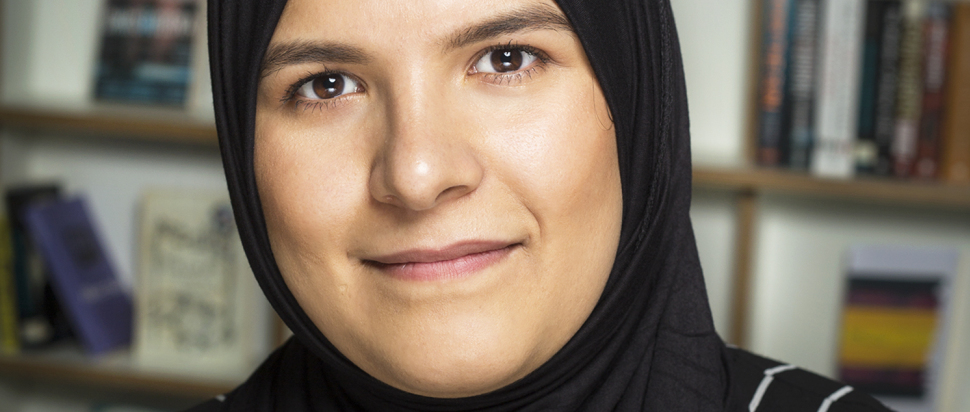Mariam Khan and Amna Saleem on It's Not About the Burqa
We meet It's Not About the Burqa editor Mariam Khan and contributor Amna Saleem to hear about this anthology of 17 Muslim women's 17 narratives, ahead of their event at Edinburgh International Book Festival
No other item of clothing seems to ignite the same reaction as the burqa. In Western media and politics, it’s become a symbol of paranoid othering, whether it’s Boris Johnson likening women wearing burqas to “letterboxes” or lazy, dangerous stereotyping that Muslim women in burqas and hijabs are either terrorists or silenced victims, most recently perpetuated in the BBC drama The Bodyguard. It was this dominating idea around Muslim women that inspired Mariam Khan to assemble It’s Not About the Burqa, an anthology that allows Muslim women to speak for themselves.
“In the book’s introduction, I write about my frustration with several things, but it was really the narrative being told about Muslim women by anyone but us,” explains Khan. “Our bodies and our stories have been politicised, therefore we have no sense of ownership over our own narrative. The book came from an amalgamation of things: my frustration of not being able to identify with the narrative of Muslim women out there in the public sphere, and that not being nuanced – that was what I wanted to challenge and tackle.”
Rather than a book about her own experiences, Khan was emphatic that It’s Not About the Burqa needed to be an anthology. “The narrative around Muslim women at the moment is singular, right? In the media, it seems like all Muslim women are one way, shape, form, and their practices and beliefs are all the same. That’s far from true. I was really fortunate to get the book deal – nothing like this book exists: there’s no book of Muslim women writing about Muslim female identity. So, what I didn’t want was to have a book by a singular Muslim woman and then that would again be turned into a singular Muslim narrative. These are 17 different essays by 17 different women which are 17 different narratives.”
One of those belongs to Glaswegian comedy writer, Amna Saleem. “When Mariam got in touch, at first I wasn’t sure if I was going to do it,” Saleem explains. “I was already abused online from people who were white racists and very religious Muslims for saying the things I eventually wrote about. But then I spoke to a few people and the consensus was that I was really passionate about this and it’s what I should be doing. I felt anxiety around it because I didn’t know how honest I could be by holding a mirror up and saying, ‘I know we suffer from racism and Muslim women suffer from misogyny but we also have problems that we need to sort out in our own community and I don’t feel like anyone’s talking about that.’”
Nuance about these issues was key for all the writers involved. “I didn’t want the book to be about my Muslim identity, singularly, or my feminism, singularly,” says Khan. “What I wanted was to create a platform. You don’t have to agree or disagree with everyone in the book; it’s just creating a space that doesn’t currently exist where we can have conversations.”
“I think we would have failed if you could identify with every single essay,” agrees Saleem. "I’m sure that some people read my essay and didn’t really get it and then read someone else’s and thought, ‘wow, that’s my life’. And that’s okay! Different people need to be seen in different ways.”
The need for disagreement is particularly prevalent in Khan’s essay, Feminism Needs to Die. “The title of my essay throws people off,” she laughs. “But I do mean the literal death of Western White Feminism. My essay is slightly different in that it targets that group, one that has a lot of privilege and controls the conversations around Muslim female identity. White women drive the narrative around women in general and it’s important for us to question them and say this space is not just yours, it’s for all women.”
Both Khan and Saleem have been delighted by the overwhelmingly positive reaction to the book. “It surprised me immensely,” says Saleem. “My inbox was full and every day there’d be a new email or a message from people saying, ‘Thank you for writing this.’ It’s really a privilege to be their voice, not in an arrogant way, but people who don’t normally feel heard or seen to feel heard or seen by the book, especially with stuff about mental health that is still so stigmatised.”
When asked how we can move beyond stereotyping and simplified narratives, Khan points to the book's nuance and attitude as a solution. “There’s the pressure of dealing with backlash from your community and outer world criticism – it’s like being in the middle of a see-saw. To me, this book is jumping off the see-saw, telling everyone and their preconceived notions to fuck off and letting everyone in the book be who they are.”
Mariam Khan, Amna Saleem and Nadine Aisha Jassat will be at the Edinburgh International Book Festival to discuss It's Not About the Burqa, 17 Aug, 7.15pm
